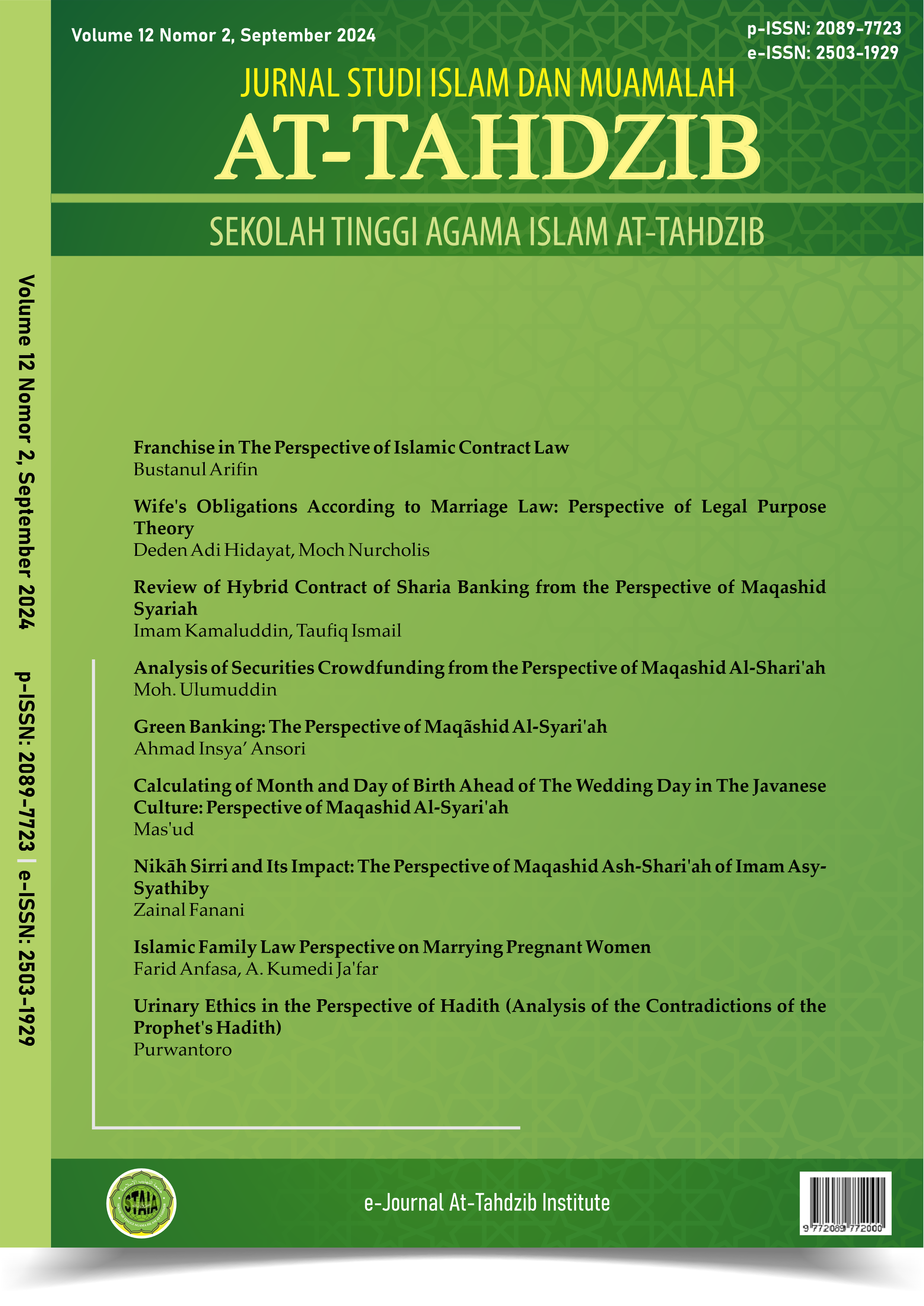Analysis of Securities Crowdfunding from the Perspective of Maqashid Al-Shari'ah
DOI:
https://doi.org/10.61181/at-tahdzib.v12i2.435Keywords:
Shari'ah fintech,, Financial inclusion, Islamic financial systemAbstract
Background. Shari’ah fintech has great potential to promote financial inclusion and improve access to financial services that comply with Islamic principles. The challenges in financial literacy, regulation, and Shari’ah compliance still need to be addressed to maximize this potential.
Aim. This study aims to describe and analyze the implementation of fintech in Shari’ah-compliant securities crowdfunding in Indonesia and evaluate its alignment with the principles of Maqashid al-Shari’ah.
Method. The research employs a descriptive-analytical approach with a qualitative method. Primary data sources include literature, regulations issued by the Otoritas Jasa Keuangan (OJK), and industry reports related to Shari’ah fintech. Data collection is conducted through document studies, analyzing relevant regulatory and industry documents. The data is analyzed using thematic analysis to identify patterns and key themes.
Result. The implementation of Shari’ah fintech in Indonesia generally aligns with the core objectives of Maqashid al-Shari’ah, namely the protection of religion, life, intellect, lineage, and wealth. Shari’ah fintech platforms successfully avoid elements of riba (interest), gharar (uncertainty), and maysir (speculation), adopting financing models like mudharabah and musyarakah. However, several challenges remain, including inconsistent regulations, cybersecurity issues, inadequate technological infrastructure, and low public financial literacy regarding Shari’ah fintech. To enhance transparency and security, technologies like blockchain and smart contracts are recommended.
References
Addury, Multazam Mansyur, Anton Priyo Nugroho, dan Salehuddin Khalid. “The Intention of Investing Sharia Stocks on Millennials: The Role of Sharia Financial Literacy.” Ihtifaz: Journal of Islamic Economics, Finance, and Banking 3, no. 2 (31 Desember 2020): 89–104. https://doi.org/10.12928/ijiefb.v3i2.3170.
Ali, Hassnian, dan Rose Abdullah. “Fintech and Financial Inclusion in Pakistan: An Exploratory Study.” Dalam Enhancing Financial Inclusion through Islamic Finance, Volume I, disunting oleh Abdelrahman Elzahi Saaid Ali, Khalifa Mohamed Ali, dan Muhammad Khaleequzzaman, 159–92. Cham: Springer International Publishing, 2020. https://doi.org/10.1007/978-3-030-39935-1_9.
Al-Syatibi, Imam. Al-Muwaafaqat fi al-Ushul al-Syari’ah. Beirut: Dar al-kutub al Islamiyah, 2003.
Arner, Douglas W., Janos Nathan Barberis, dan Ross P. Buckley. “The Evolution of Fintech: A New Post-Crisis Paradigm?” SSRN Scholarly Paper. Rochester, NY, 1 Oktober 2015. https://doi.org/10.2139/ssrn.2676553.
———. “The Evolution of Fintech: A New Post-Crisis Paradigm?” SSRN Scholarly Paper. Rochester, NY, 1 Oktober 2015. https://doi.org/10.2139/ssrn.2676553.
Ashker, Ahmed el-, dan Rodney Wilson. Islamic Economics: A Short History. Themes in Islamic Studies 3. Leiden: Brill, 2006.
Azizah, Siti N. “The Adoption of FinTech and the Legal Protection of the Digital Assets in Islamic/Sharia Banking Linked with Economic Development: A Case of Indonesia.” The Journal of World Intellectual Property 26, no. 1 (2023): 30–40. https://doi.org/10.1111/jwip.12257.
Billah, Mohd Ma’Sum, Suhail Ahmad, dan Sahibzada Ghisaul Haq. “Emergence of I-FinTech in the Contemporary Socio-Economic Reality.” Dalam Islamic FinTech: Insights and Solutions, disunting oleh Mohd Ma’Sum Billah, 3–18. Cham: Springer International Publishing, 2021. https://doi.org/10.1007/978-3-030-45827-0_1.
Creswell, John W., J. David Creswell, John W. Creswell, dan J. David Creswell. Research Design: Qualitative, Quantitative, and Mixed Methods Approaches. Fifth edition. Los Angeles London New Delhi Singapore Washington DC Melbourne: SAGE, 2018.
Dusuki, Asyraf Wajdi, dan Nurdianawati Irwani Abdullah. “Maqasid al-Shari`ah, Maslahah, and Corporate Social Responsibility (2007)*.” American Journal of Islam and Society 41, no. 1 (5 Februari 2024): 10–35. https://doi.org/10.35632/ajis.v41i1.3417.
Gamal, Mahmoud A. El-. Islamic Finance: Law, Economics and Practice. Cambridge: Cambridge University Press, 2006.
Haron, Razali, dan Khairunisah Ibrahim. “Islamic Financing in Mitigating Access to Financing Problems of SMEs in Malaysia: A Survey Analysis.” Intellectual Discourse 24 (28 Desember 2016). https://doi.org/10.31436/id.v24i0.926.
Hasan, Rashedul, Mohammad Kabir Hassan, dan Sirajo Aliyu. “Fintech and Islamic Finance: Literature Review and Research Agenda.” International Journal of Islamic Economics and Finance (IJIEF) 3, no. 1 (28 Januari 2020): 75–94. https://doi.org/10.18196/ijief.2122.
Kamali, Mohammad Hashim. Maqasid Al-Shari’ah Made Simple. International Institute of Islamic Thought, 2008. https://doi.org/10.2307/j.ctvkc67vz.
“Layanan Urun Dana Melalui Penawaran Saham Berbasis Teknologi Informasi (Equity Crowdfunding).” Diakses 25 Mei 2024. https://ojk.go.id/id/regulasi/Pages/Layanan-Urun-Dana-Melalui-Penawaran-Saham-Berbasis-Teknologi-Informasi-(Equity-Crowdfunding).aspx.
Lee, In, dan Yong Jae Shin. “Fintech: Ecosystem, Business Models, Investment Decisions, and Challenges.” Business Horizons 61, no. 1 (Januari 2018): 35–46. https://doi.org/10.1016/j.bushor.2017.09.003.
Lu, Haitian, Bingzhong Wang, Qing Wu, dan Jing Ye. “Fintech and the Future of Financial Service: A Literature Review and Research Agenda.” SSRN Scholarly Paper. Rochester, NY, 14 Mei 2020. https://doi.org/10.2139/ssrn.3600627.
Mollick, Ethan R. “The Dynamics of Crowdfunding: Determinants of Success and Failure.” SSRN Electronic Journal, 2012. https://doi.org/10.2139/ssrn.2088298.
Muryanto, Yudho Taruno, Dona Budi Kharisma, dan Anjar Sri Ciptorukmi Nugraheni. “Prospects and challenges of Islamic fintech in Indonesia: a legal viewpoint.” International Journal of Law and Management 64, no. 2 (1 Januari 2021): 239–52. https://doi.org/10.1108/IJLMA-07-2021-0162.
Oseni, Umar A., dan S. Nazim Ali, ed. Fintech in Islamic finance: theory and practice. London ; New York: Routledge/Taylor & Francis Group, 2019.
Siddiqi, Mohammad Nejatullah. “Islamic Banking And Finance In Theory And Practice: A Survey Of State Of The Art.” Islamic Economic Studies 13–2 (2006): 2–48.
Yin, Robert K. Case Study Research: Design and Methods. 5. edition. Los Angeles London New Delhi Singapore Washington, DC: SAGE, 2014.
Downloads
Published
Issue
Section
License
Copyright (c) 2024 Moh. Ulumuddin

This work is licensed under a Creative Commons Attribution 4.0 International License.




